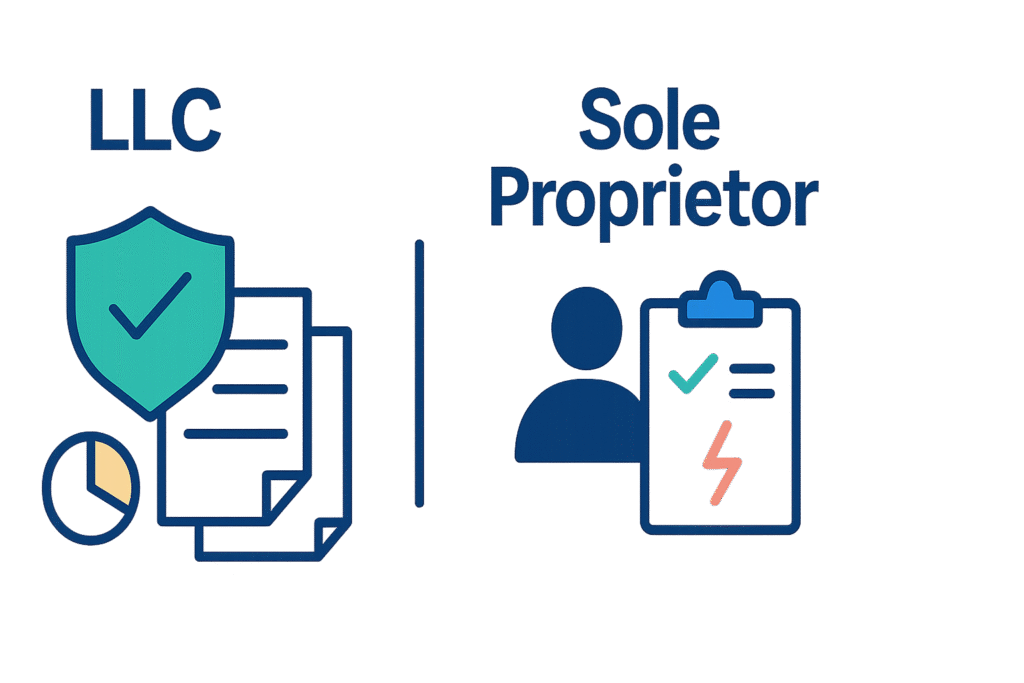By MyBizNerd • Updated Oct 11, 2025

LLC vs Sole Proprietor — the real-world difference
Choosing between an LLC and a sole proprietorship can feel like alphabet soup—but it’s actually one of your most important early decisions. This guide explains liability, taxes, and setup in plain English, and shows when it’s smart to start simple or upgrade. Whether you’re freelancing on the side or turning a passion into a business, you’ll leave knowing which path fits your goals (and risk tolerance).
Bottom Line
Choose Sole Proprietor if you want…
- Fast & simple start (no state filing).
- Low cost and minimal admin.
- You’re testing a low-risk idea or doing small gigs.
Choose LLC if you want…
- Liability separation between you and the business.
- Tax flexibility (stay default or elect S-Corp later).
- Credibility with clients, partners, and lenders.
Comparison Table
| Sole Proprietor | LLC (default) | |
|---|---|---|
| Liability | No personal liability protection. | Limited liability (maintain separation; no fraud/co-mingling). |
| Taxes | Report on Schedule C; self-employment tax on net profit. | Default pass-through (disregarded or partnership). Option to elect S-Corp (Form 2553). |
| Costs | Minimal (licenses, DBA if any). | State filing + registered agent + annual/biennial reports. |
| Admin | Simple bookkeeping; quarterly estimated taxes. | Operating agreement, separate bank account, compliance calendar. |
| Credibility | Good for small gigs and tests. | Often preferred by clients/partners. |
When S-Corp Election Might Help
With an LLC, you can elect to be taxed as an S-Corporation. If profits comfortably exceed a reasonable salary for your role, you may pay yourself a salary (W-2) and take remaining profits as distributions, potentially lowering self-employment tax. It adds payroll/admin costs — run the numbers first.
- Potential self-employment tax savings.
- Cleaner split: salary vs distributions.
- Payroll + compliance overhead.
- Must pay a “reasonable salary.”
- Stable profits (often $60k+ net, context-dependent).
- Owner actively working in the business.
Learn more: IRS: S-Corporations
Quick Savings Simulation
Very simplified; for educational use only. Assumes 15.3% SE tax rate on sole-prop/LLC default and FICA on S-Corp salary. State taxes not included.
Tip: Use this as a conversation starter with a CPA; adjust for your state.
Setup Steps (Both Paths)
Sole Proprietor
- Check if you need a local business license.
- (Optional) File a DBA/Trade Name if not using your legal name.
- Get an EIN (free) from the IRS.
- Open a dedicated business bank account (separate finances).
- Set up simple bookkeeping + quarterly estimated taxes.
Internal help: Accounting Basics • Expense Tracker Template
LLC
- Search name availability with your state Secretary of State.
- File Articles of Organization; appoint a registered agent.
- Create an Operating Agreement (even for single-member).
- Get an EIN (free) from the IRS.
- Open a business bank account; keep strict separation.
- Track annual/biennial report deadlines; consider S-Corp when appropriate (Form 2553).
Learn more: SBA: Choose a structure
Useful Links
- IRS — Schedule C
- IRS — Schedule SE (Self-Employment Tax)
- IRS — Form 2553 (S-Corp Election)
- SBA — Choose a business structure
- IRS — EIN
- State name search portals (examples): CO • CA • FL • NY • GA
FAQs
Can I start as a sole proprietor and switch to an LLC later?
Yes. Many owners start as sole props, then form an LLC once revenue, contracts, or risk grows. You’ll update bank accounts, tax info, and contracts under the new entity.
Do I need a separate bank account?
For LLCs, yes — to protect the liability shield. For sole props, it’s strongly recommended for clean records and easier taxes.
What’s a “reasonable salary” for S-Corp owners?
It depends on your role, industry, and location. Benchmark against what you’d pay someone else to do that job. Keep documentation.
Sources & Further Reading
Disclaimers
Educational only, not legal/tax advice. This page provides general information and a simplified calculator. Your situation may differ. Consult a qualified attorney or CPA before making decisions. External links are provided for convenience; MyBizNerd does not control third-party content.

Leave a Reply